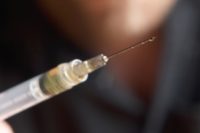How was the Texas nurse exposed to Ebola?
 An Ebola diagnosis for a healthcare worker at Texas Presbyterian Hospital who cared for a patient with the disease has the Centers for Disease Control and Prevention (CDC) scrambling to determine how she was exposed despite wearing a protective gown, gloves, mask and shield.
An Ebola diagnosis for a healthcare worker at Texas Presbyterian Hospital who cared for a patient with the disease has the Centers for Disease Control and Prevention (CDC) scrambling to determine how she was exposed despite wearing a protective gown, gloves, mask and shield.
“This is understandably disturbing news for the patient, the patient’s family and colleagues and the greater Dallas community,” according to a statement by the CDC. “The CDC and the Texas Department of State Health Services remain confident that wider spread in the community can be prevented with proper public health measures including ongoing contact tracing, health monitoring among those known to have been in contact with the index patient and immediate isolations if symptoms develop.”
Nurse treated Duncan
Nurse Nina Pham, 26-years-old, is reportedly in stable condition after testing positive for Ebola. She was isolated after the initial report of a fever – and remains so. Pham was among the first to treat Thomas Eric Duncan, the Liberian man who denied being exposed to the disease on a health screening questionnaire prior to flying to the U.S. Duncan reportedly was exposed when he helped a pregnant woman in Liberia who was suffering from Ebola get to a hospital. Both the woman and Duncan ultimately succumbed to the disease.
The case has alarmed both the healthcare industry and the general public, and has forced hospitals to reexamine their readiness to handle Ebola cases which may make their way to the U.S. – or be contracted here.
One area being examined: how healthcare workers remove their protective gear.
The CDC says the risk of an Ebola outbreak in the United States is very low, although it calls the current Ebola epidemic “the largest in history,” affecting multiple countries in West Africa. All but a handful of the 8,400 cases that have been reported have occurred in Liberia, Guinea, and Sierra Leone.
The agency and its partners are taking precautions to stem the spread of the disease.
Here’s the latest update from the CDC:
- CDC is implementing enhanced entry screening at five U.S. airports that receive over 94% of travelers from Guinea, Liberia, and Sierra Leone.
- A confirmed case of Ebola has been reported in Spain.
- On September 30, 2014, CDC confirmed the first travel-associated case of Ebola to be diagnosed in the United States. The patient passed away on October 8, 2014.
- New cases continue to be reported from Guinea, Liberia, and Sierra Leone.
- Nigeria and Senegal have not reported any new cases since September 5, 2014, and August 29, 2014, respectively. All contacts in both countries have now completed their 21-day follow up, with no further cases of Ebola reported.
- The Democratic Republic of the Congo (DRC) has reported cases of Ebola. These cases are not related to the ongoing outbreak of Ebola in West Africa.
Ebola is spread through direct contact with bodily fluids of a sick person or exposure to objects such as needles that have been contaminated. The illness has an average 8-10 day incubation period (although it could be from 2 to 21 days) so CDC recommends monitoring exposed people for symptoms a complete 21 days. People are not contagious during the incubation period, meaning before symptoms such as fever develop.
Looking for a reprint of this article?
From high-res PDFs to custom plaques, order your copy today!






